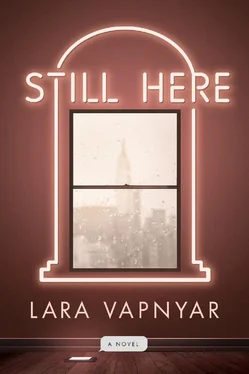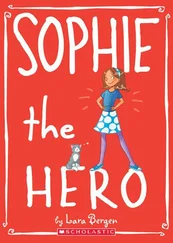Vadik picked up one of the books stacked on the adjacent table for sale and signing. The Frozen Train. Vadik opened it to page one and read a couple of sentences. He hadn’t had that much experience reading fiction in English, so he knew that he wouldn’t be able to form a trustworthy opinion, but he liked what he read. The prose was dense, with a thorough absence of clarity, no clearings, no cracks that would allow even the thinnest ray of light, no loopholes, no compromises. You had to respect the guy. Vadik raised his eyes from the book and met Rachel’s quizzical stare. She was sitting just two tables away from him. She must have walked in while he was reading and taken a seat somebody had saved for her. She looked away as soon as their eyes met and fixed her gaze on the writer. There was no way to tell if she recognized him or not. She looked plainer than in her photographs, much plainer than he had remembered. But he experienced a shock of recognition so great that his whole body contracted in a painful spasm. There was Rachel. His own Rachel. And the whole bar started to crumple. The writer’s voice turned to a distorted drone. The Communist posters blended with the walls. The people turned into blurry figures. There was only Rachel. Sitting as if in a vacuum. Excruciatingly real, unbearably close. So close that he thought he could see her heart beat under her thin white sweater with some sort of ridiculous leather appliqué across the front.
She didn’t look at him once. The reading ended and she stood up, raised her hands above her head, and gave the writer tensely enthusiastic applause. Other people started to clap too. The writer inched from behind the podium to the table where he was supposed to sign books. A young red-headed girl arranged the books in a beautiful pyramid, then put a pen and a glass of water next to it. She looked over at Vadik and saw that he was holding a copy of The Frozen Train. “Do you want to purchase the book, sir?” she asked. “It’s twenty-five dollars.”
Vadik reached for his wallet, gave the girl two crumpled twenties, and turned to search for Rachel. She was still at the same table talking to a whole bunch of people, nodding eagerly. “Do you want me to sign it?” the writer asked. He was drinking water from the glass and it was dripping down his neck into the opening of his shirt. “Yes, please,” Vadik said.
“Your name?” the writer asked.
“Vadim.”
“Spelling?”
Vadik paused. He couldn’t remember.
“Just sign it, please,” he said to the writer, and the writer shrugged and made a fat, ugly doodle in the middle of the title page.
“Here’s your change, sir,” the bookseller said, handing Sergey a wad of bills.
Rachel was still talking to those people. Vadik decided that it would be best if he approached her outside. He would come up to her as she exited the bar and introduce himself. It was unlikely that she would be alone. He would still go and talk to her. He would ask her for a drink. There was no plan B.
People were exiting the bar in groups. Chatting, laughing, discussing plans for the evening. They had no idea how irrelevant they all were. Vadik kept looking at the door.
He expected to see her in about twenty minutes or so. She appeared in three. Alone. Wearing a blue raincoat. She stopped on the top step, took a beret out of her bag, put it on, and headed down the steps.
“Rachel,” he said, stepping forward. It sounded too coarse and was barely audible. “Rachel,” he said again. She stopped and looked at him. She was a few steps above the ground, so their eyes were on the same level. She reacted with the polite uncomprehending smile that he had anticipated and feared. But then almost immediately she gasped and said, “Oh!” She walked the few steps down and looked up at him. “Vladimir, isn’t it?”
He hadn’t expected this. He had expected her not to remember his name at all, but to use another name? And a Russian name at that. Like he was just some random Russian guy with some random Russian name.
“Vadik,” Vadik said.
She crinkled her nose in embarrassment. “Right! I’m sorry!”
That bulky beret looked ugly on her. He could see that she had aged a little bit. She wasn’t wearing any makeup, which made her look strangely exposed, unprotected. There were sharp lines as if separating her mouth from her cheeks. And her beautiful amber eyes looked even brighter, highlighted by the dark circles underneath. She kept touching her lips, kneading them with the knuckles of her fingers. He couldn’t remember if that was something she had done back then.
“I enjoyed the reading,” Vadik said, pointing to the book under his arm.
“Thank you! I thought it went very well too. And thank you for buying the book! I’m John’s editor, you know. Do you like his work?”
Vadik said that even though he hadn’t read that much of Garmash’s work, he admired how there weren’t any compromises, no deference to public demands. Not a lot of people were brave enough to write like that anymore.
Rachel was nodding eagerly. She seemed to warm to Vadik a little bit. Now was his chance to ask her for a drink. He made a huge effort to quiet his twitchy heart and did just that.
“Well, it would have to be a very quick drink, then,” she said. “I have to be home by ten.”
Vadik didn’t know any nice places in the neighborhood. He was kicking himself for not having done any research on the neighborhood before the reading.
“This one looks okay,” Rachel said, pointing to a bar next door.
They went in, winced at the loud fifties music, and walked to a table in the quietest corner. Rachel ordered a glass of wine, Vadik a beer, and by the time they finished them, they managed to exchange all the important facts about their lives. Rachel was lucky to get an internship at Random House right after she graduated, and even luckier to get a permanent position in a year. Then one of the senior editors left to open her own house and took Rachel with her. She was paid next to nothing, but she loved her job. His own job was too materialistic, Bob’s applications too silly. There wasn’t any existential meaning in Dancing Drosophilae whatsoever. Its main purpose was to advertise more genetic testing for medical companies. And, anyway, his position at Bob’s company was too low.
He said that he was a partner in a start-up that was developing an amazing application. It would allow you to keep your online voice after you died. And not just an online voice, but the very essence of a person. Because where else could we find our essence nowadays? Social media.
Rachel seemed to be impressed. She said that it must be very challenging.
“It is challenging,” Vadik said, “but if you get some excellent programmers and team them up with some excellent linguists, it’s very doable.”
He wondered if he should mention Fyodorov, then thought better of it. He said that it had been Shakespeare’s Hamlet that had given him the idea.
“ Hamlet ?” she asked.
“Yes,” he said. “ ‘The rest is silence.’ ”
“Oh, yeah, yeah,” she said, “ Hamlet. You probably know the whole thing by heart too.”
Vadik detected a mocking note in her tone, but that could have been his paranoia. As a matter of fact, he did remember quite a few passages from Hamlet in Pasternak’s translation.
To change the subject, he said that he lived in Williamsburg now. He loved the neighborhood.
Rachel lived in Greenpoint. With her fiancé, Peter, a journalist. They were getting married in May. This bit of news didn’t shock Vadik. Rachel’s demeanor had already told Vadik that she was either married or in a serious relationship. It was as if she was wearing a T-shirt with huge letters on it spelling out TAKEN on the front. Vadik felt a desperate need to lie that he used to have a fiancée as well.
Читать дальше












